The week before Joshua Burch's promotion to corporal, no one dreamed the Marine would be able to stand during it, let alone walk.
Burch is a paraplegic, paralyzed from the chest down, from an accident in Guam that he doesn't remember.
All he knows is that one minute, he was speaking with his sergeant in a hotel room, and then, it's the next day, he is on the ground outside the hotel being rousted by an employee, and he can't move — not his hands, his arms or legs.
"They were trying to lift me up, get me to move. But that wasn't going to happen," Burch said.
Burch had sustained a fracture to his seventh cervical vertebrae — the lowest bone in his neck. At 21, the aircraft rescue and firefighting specialist had little use of his arms, none of his legs and an indeterminate prognosis for eventual mobility.
But friends and family members say Burch never gave up hope for regaining use of his limbs. And after several surgeries and recovery in Hawaii, he was transferred to the Polytrauma Rehabilitation Center at McGuire VA Medical Center in Richmond, Virginia, to see just how far he could push his body.
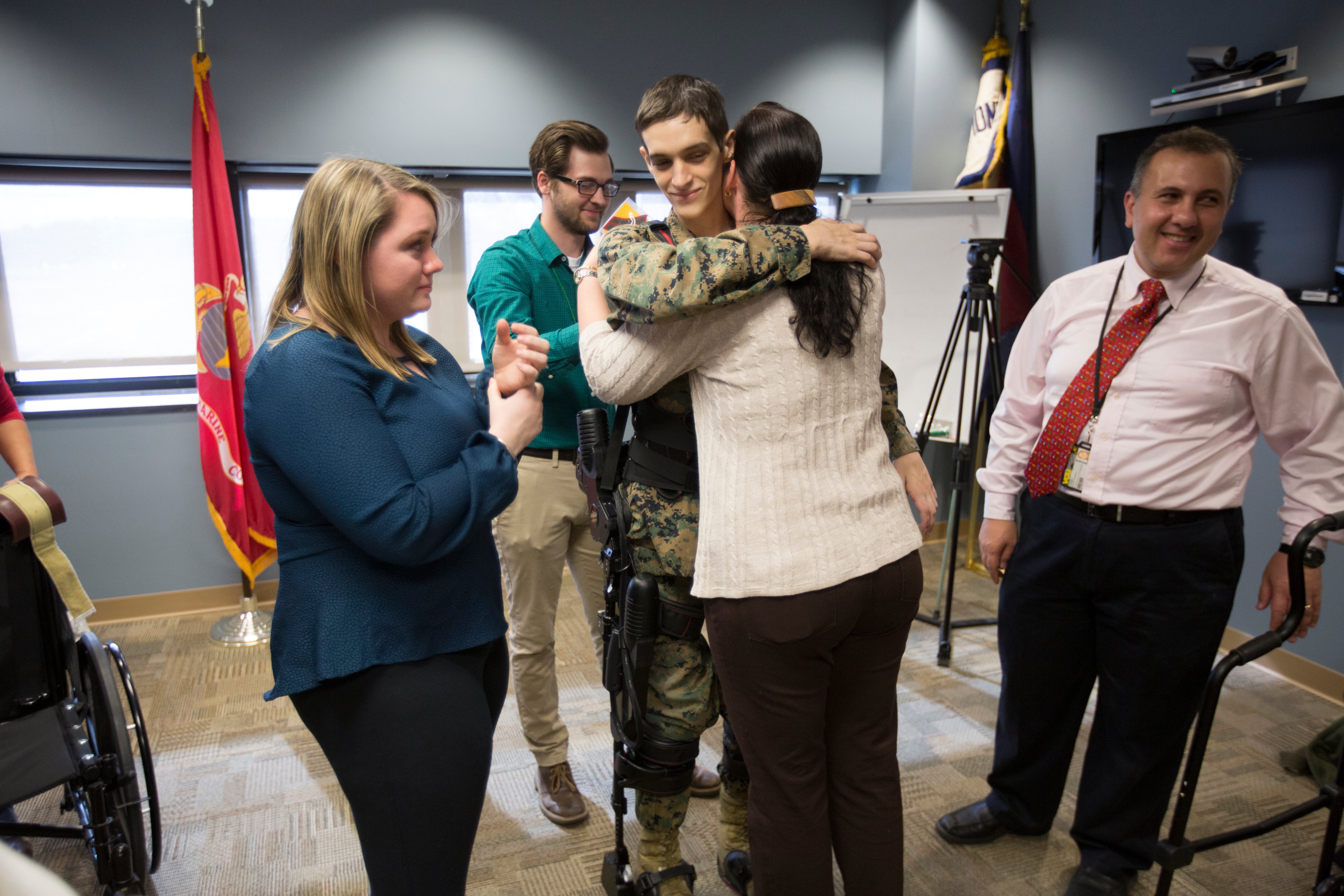
Burch hugs his mother, Emily Burch, after his promotion ceremony.
Photo Credit: Mike Morones/Staff
And it turns out, with a little assistance from technology, the paralyzed Devil Dog can walk.
"He's humble and he's tough. If anyone can do this, it's him, and his motivation improves every day by leaps and bounds," said his brother, Marine Staff Sgt. Travis Burch.
"This," is doing what was once unthinkable for anyone with a major spinal cord injury: standing on their two feet and walking with crutches and the assistance of wearable, robotic leg braces.
For Dr. Ashraf Gorgey, chief of spinal cord injury research at the VA center, the recently injured Burch, with his youth and fighting spirit, was the perfect patient to test the department's Ekso GT, a lower-body exoskeleton and accompanying battery pack used for rehabilitation.
"A person with a spinal cord injury who has the ability to stand and walk is a breathtaking thing," Gorgey said during Burch's second workout with the Ekso on Feb. 5. "Not only are there obvious physical and psychological benefits but the physiological impact is huge. The act of walking can prevent so many other health issues associated with long-term paralysis, including heart disease, diabetes, muscular atrophy, bone loss."
The first time Burch used the "magic legs" — an appointment usually reserved for fitting and learning to stand — he took 256 steps down a hospital hallway, his first since the accident Sept. 8.
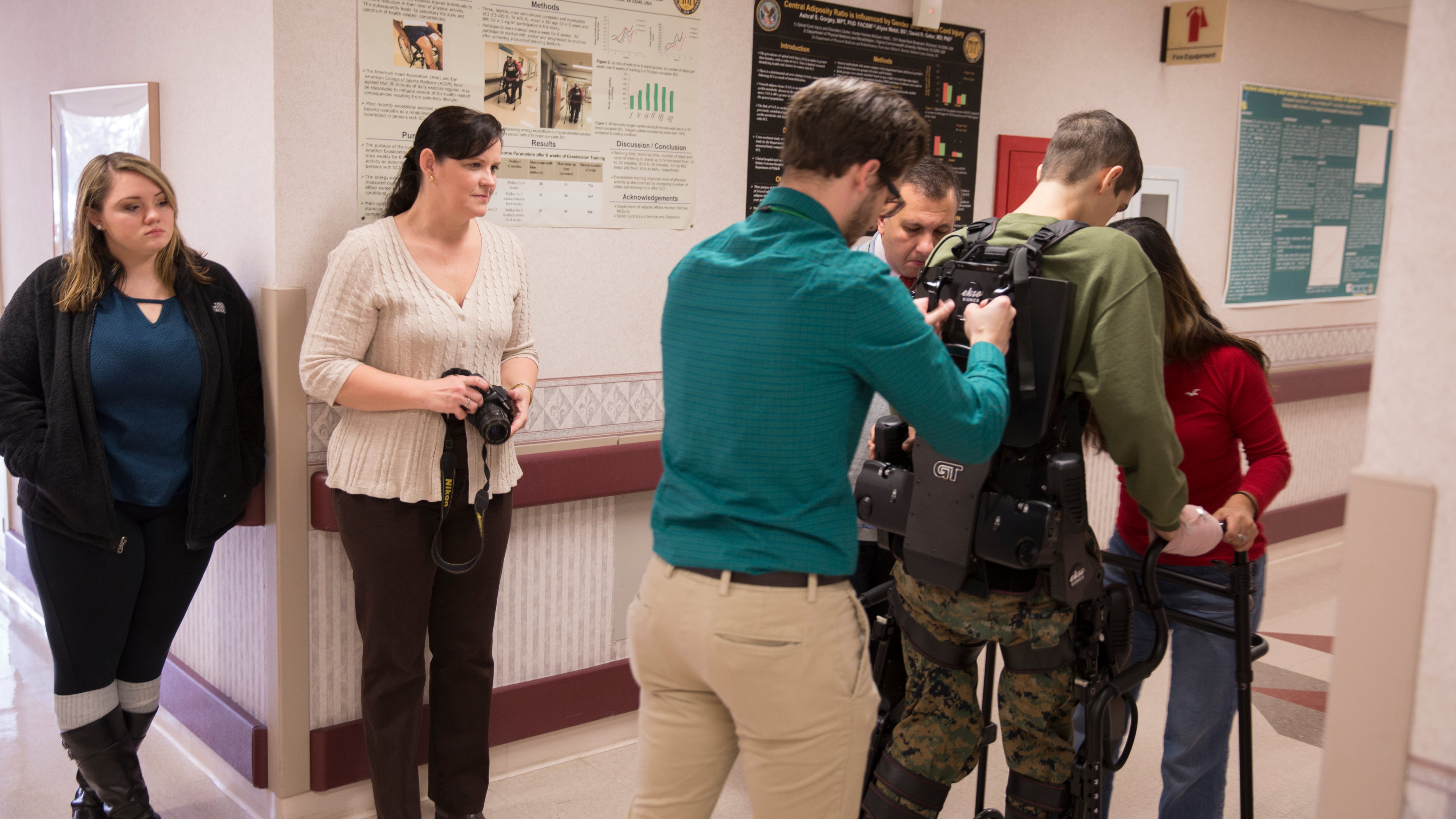
Haleigh Grimes, left, and Emily Burch watch as Josh Burch is able to walk and stand with assistance from a robotic exoskeleton at Hunter Holmes McGuire VA Medical Center.
Photo Credit: Mike Morones/Staff
His mother, Emily Burch, cried.
"He didn't want to stop. It's why the therapists here like working with Marines, because they always want to do more than asked of them. They want to push through," said Emily Burch, who has four sons who were or are now serving in the Corps.
A week later, Burch did two laps around the hospital ward — 486 steps — making so much progress that Gorgey said he could borrow the Ekso for a special event later that day: his promotion to corporal.
The ceremony was the first military promotion Gorgey had ever seen.
"It's very exciting. For patients to be able to interact at eye level for everyday reasons but for life's big events, like standing for one's wedding, well, I don't want to say it's a miracle, but it seems like a miracle," Gorgey said.
Since 2011, the Veterans Health Administration has sponsored an exoskeleton research project, with a different brand, the ReWalk, made by ReWalk Robotics, at the James J. Peters Veterans Affairs Medical Center in New York.
Veterans who have used the exoskeletons say they provide hope that someday they will be able to walk around their own homes and neighborhoods.
In 2014, retired Marine Capt. Derek Herrera became one of the first Americans to own a ReWalk, after the FDA approved the device for home use. The MARSOC Foundation raised the funds to purchase the device, which cost nearly $70,000 for the Marine, who had been paralyzed by a sniper's bullet in Afghanistan in 2012.
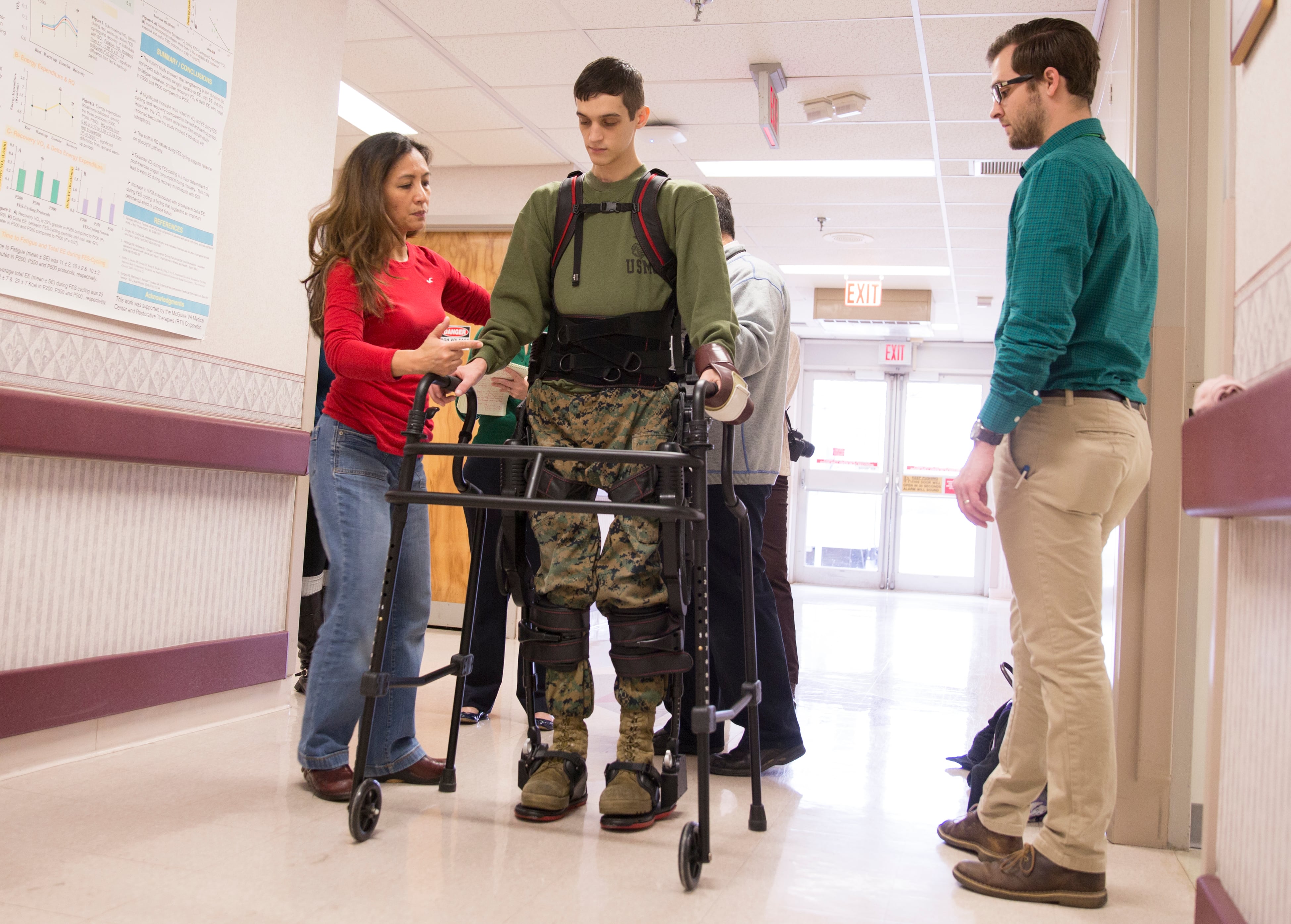
Physical therapists guide Cpl. Josh Burch as he walks for the second time with assistance from a robotic exoskeleton.
Photo Credit: Mike Morones/Staff
Burch hopes someday he may have the same opportunity.
"I definitely would like to have a personal one of these," he said.
At least 13 companies are in the exoskeleton market, some concentrating on medical use for people with disabilities, while others, like Lockheed Martin, are exploring the potential for combat, where they might be used to help bolster an infantryman or woman's strength and endurance.
Despite the exoskeletons' potential to help the paralyzed walk, not every paraplegic is a candidate for using one, according to Gorgey. Those who were injured years ago and have lost bone density and muscle mass, or are not in good health, would not be able to control the device.
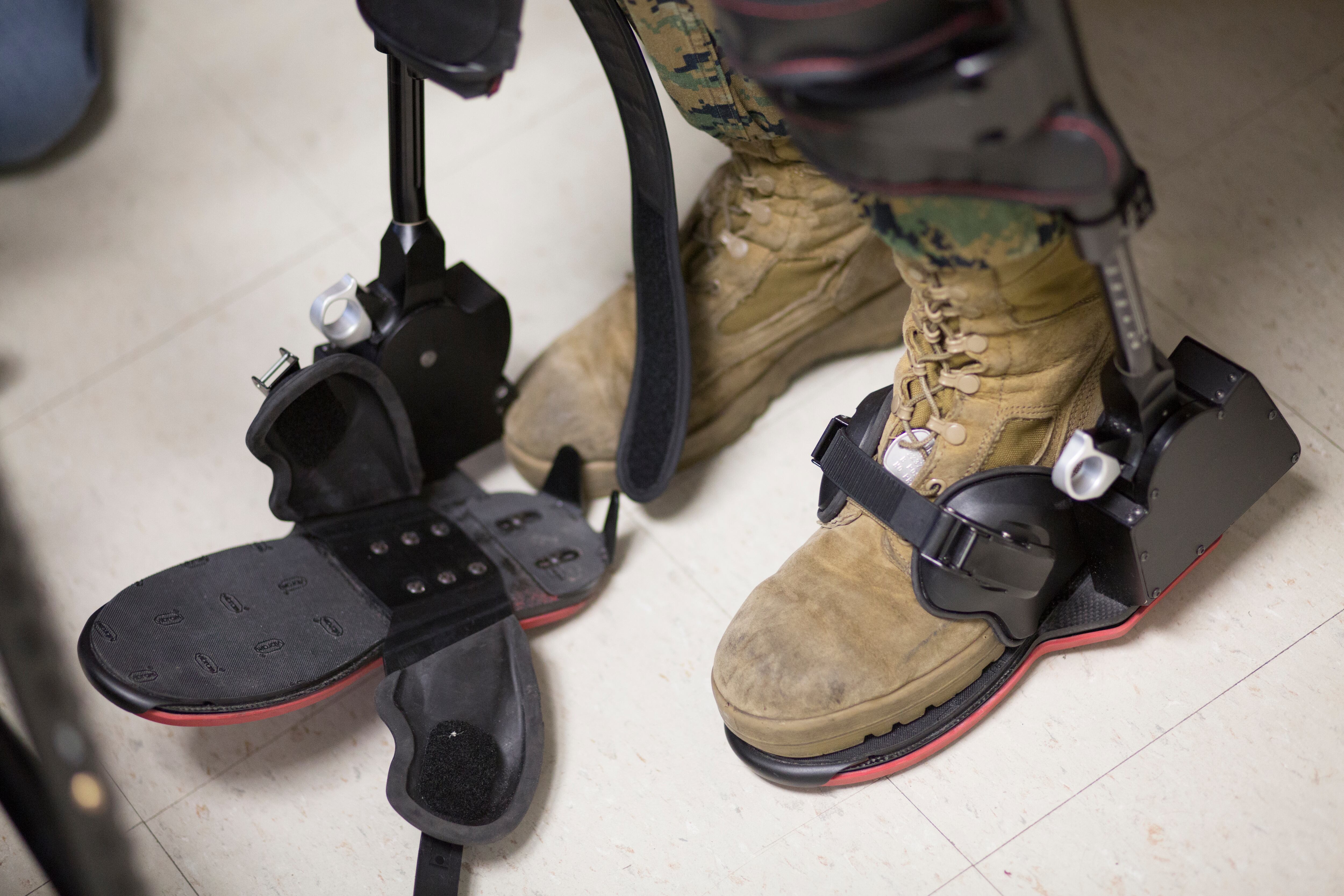
Burch places his feet into the exoskeleton. The leg braces required adjustment to accommodate Burch's thick-soled boots.
Photo Credit: Mike Morones/Staff
Burch said it is tricky learning how to maneuver the device, which requires the user to lean forward but not fall over.
"It's different using it. To move it you shift your weight, using your own power. It's weird," Burch said. "But it's good."
For now, Burch is practicing once a week with the bionic leg braces and computer and using a walker for support. Eventually, he will move on to crutches for support and be able to control the movement on his own.
But on Feb. 5, with assistance from Gorgey and physical therapist Lynette Villadelgado, Burch donned his uniform and boots, strapped on the bionic braces and leaned on a walker for his promotion.
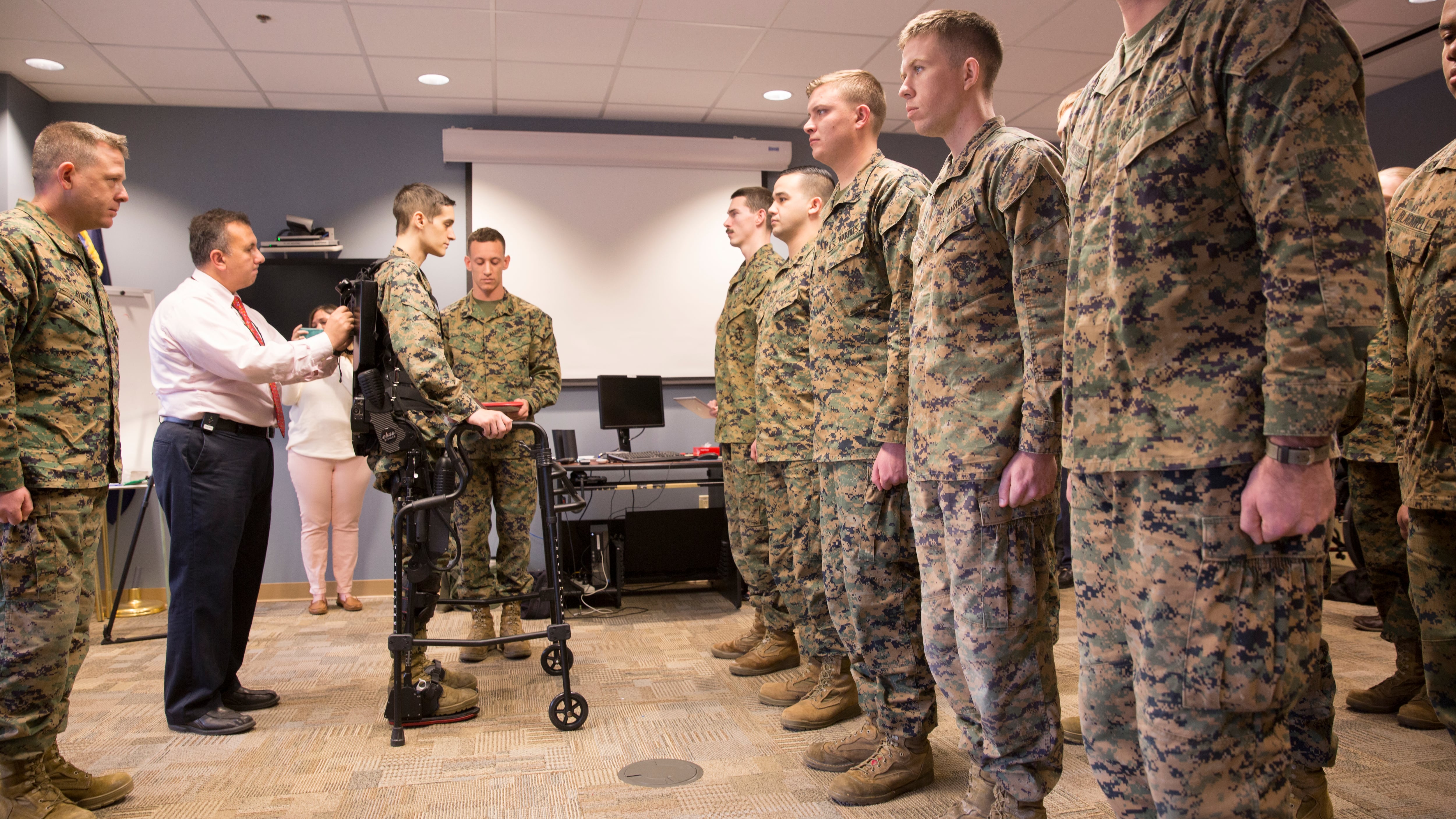
Burch is able to walk and stand at his promotion ceremony with assistance from a robotic exoskeleton.
Photo Credit: Mike Morones/Staff
After rising from his wheelchair and taking 14 steps, Burch stood front and center in a room full of Marines, facing Naval Medical Center Portsmouth Marine Corps Liaison Officer-In-Charge Maj. Jonathan Bonar. His Marine staff sergeant brother Travis read his orders.
Gorgey could not have been more proud.
"I've spent a career being asked the question 'Do you think one day I will be able to walk again?' I used to not be able to answer that question. Now I can tell my patients that they will stand and they will walk."
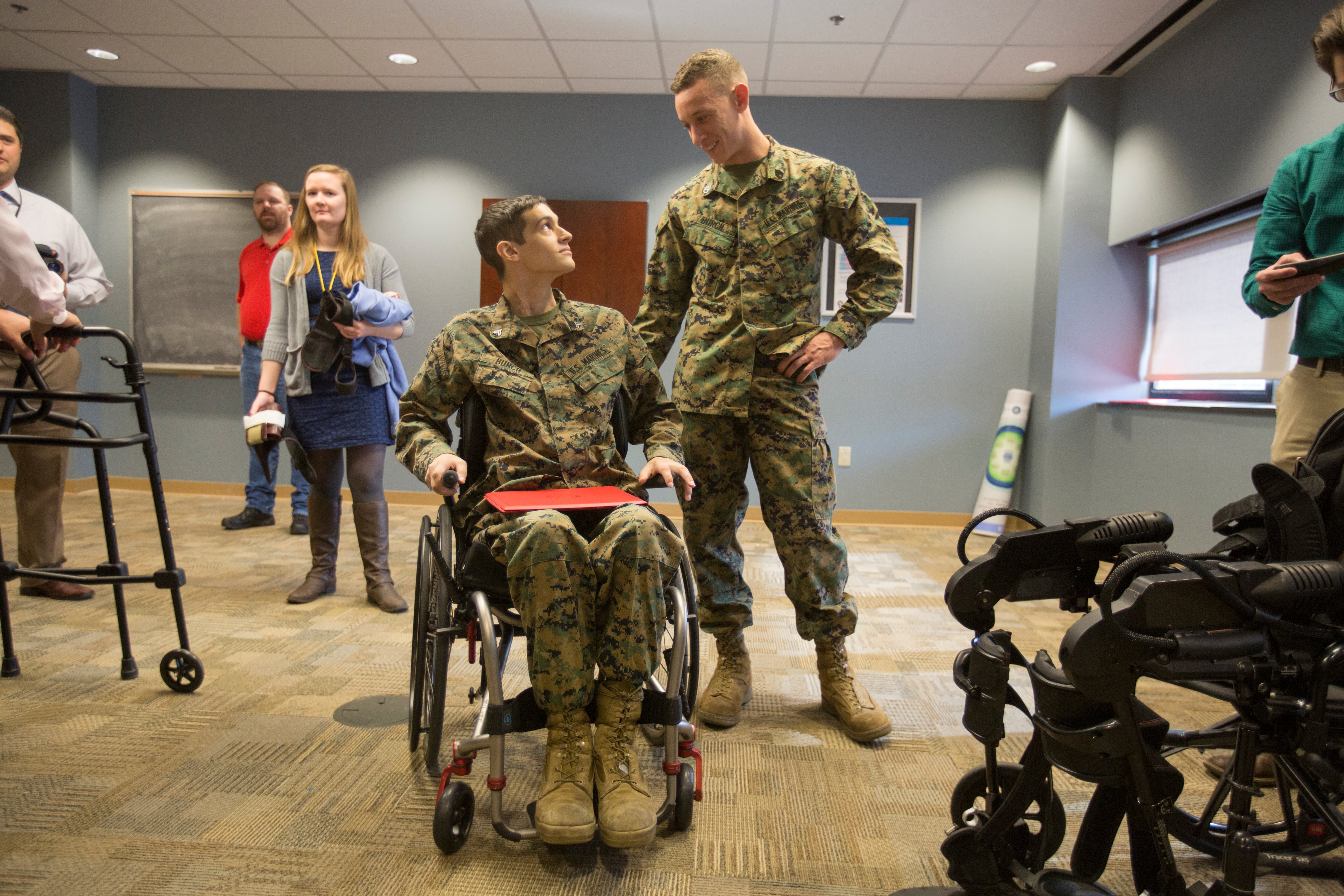
Josh Burch talks with his brother Staff Sgt. Travis Burch after Josh's promotion at Hunter Holmes McGuire VA Medical Center in Richmond, Va., on Feb. 5.
Photo Credit: Mike Morones/Staff
Patricia Kime is a senior writer covering military and veterans health care, medicine and personnel issues.




